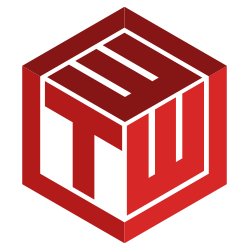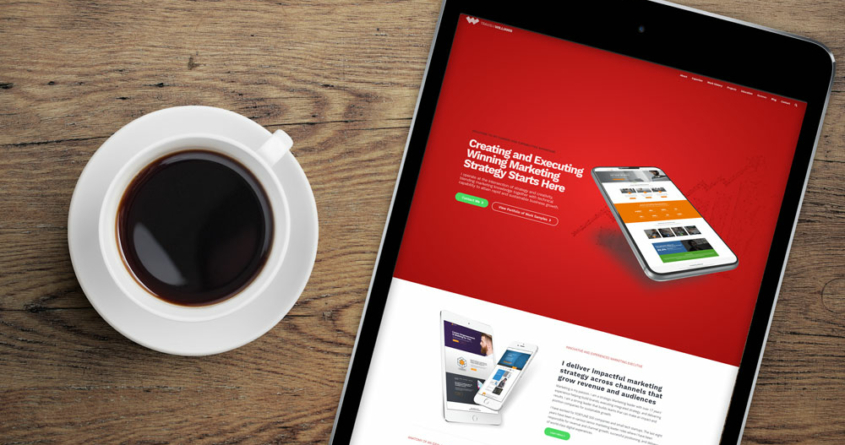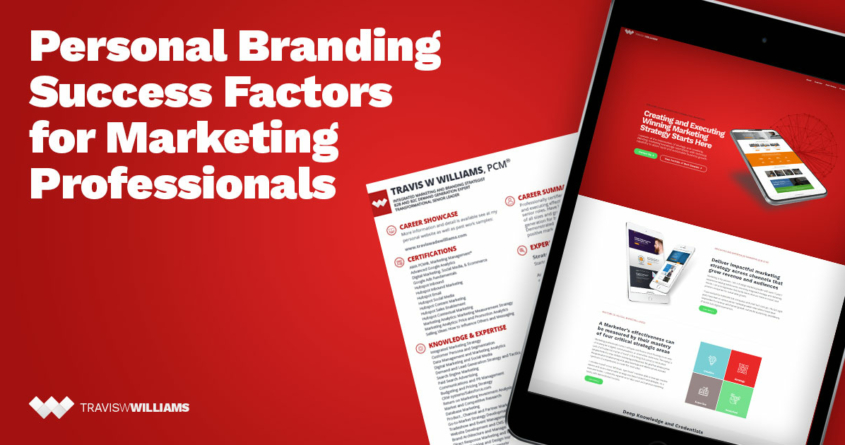Why Creating a Website Makes Sense for Personal Branding Success
As someone who has had the opportunity and been responsible for building high-performing marketing teams, the process of selecting talent can be frustrating. Marketing professionals are knowledgeable on how to position, differentiate, message, and showcase; or at least they should be. We get swamped with hundreds of typical and often-times boring run-of-the-mill resumes from applications. Recruiters typically assess keywords combinations and minimum requirements for hiring managers who then do about a 3-4 minute review before deciding next steps. I often asked myself why a modern marketer doesn’t do more to really stand apart and sell me on why their brand and offering is viable for my business. I mean the decision-making process for making a hire is so similar to a buyer’s journey already. Shouldn’t talent appeal to what decision makers want to see?
I want to be sold on what you can do for my business by looking at how you sell yourself. Do you stand out in a competitive talent market?
Some people might still enjoy the antiquated black and white resume and cover letter. Sure I might see bits and pieces of information and results on how you can drive results if I go looking for it. Is there enough there to suggest your skills are really different from the next applicant and make me want to talk to you? With all of the modern tools and applications at our disposal, why great talent isn’t doing more to sell me on them makes me scratch my head. You are your own brand and I am looking for your services to enhance my business.
Think of your personal website as the main place where people go to learn about you. I advise others to keep your actual resume somewhat limited in its information. This is much the same way we would not create a marketing brochure for our product that explained EVERYTHING! Make them want to see more.
Below I will outline simple, yet worthwhile strategies for utilizing a career showcase website in your personal branding strategy. There are a lot of other examples out there but I will highlight my own strategy and website I utilize during my career transition. Sure, not every hiring manager will view through the same lens but like in business, a lot of times it is about selling the sizzle and not the steak. Make an memorable impression when you can!
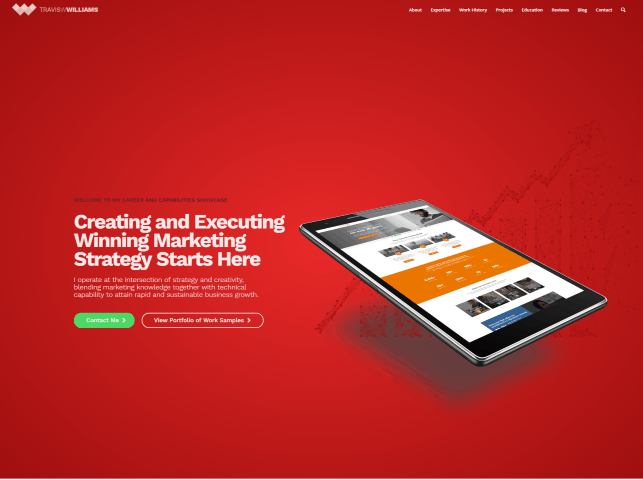
Creating a great looking website that showcases your brand and capabilities to potential employers is easier than you think.
Let’s begin. Do you have a website for your personal brand?
What does almost every business have in common today? You guessed it, they are online showcasing their brand and company out there for interested people to see. A website is a given in today’s digital economy and is often a primary source of business for many. Marketing professionals understand this and much of our time is spent optimizing this channel to increase awareness and modernization. You should at the very minimum utilize a landing page or personal showcase to help position your skills, experience, portfolio items (if you have them). There really isn’t any excuse anymore with the plethora of tools available online to create an inexpensive and decent looking website for people of all skill levels. You don’t need to be a design professional either. Here are some winning ideas:
1. WordPress Hosting Instance (pick your provider) and a good theme
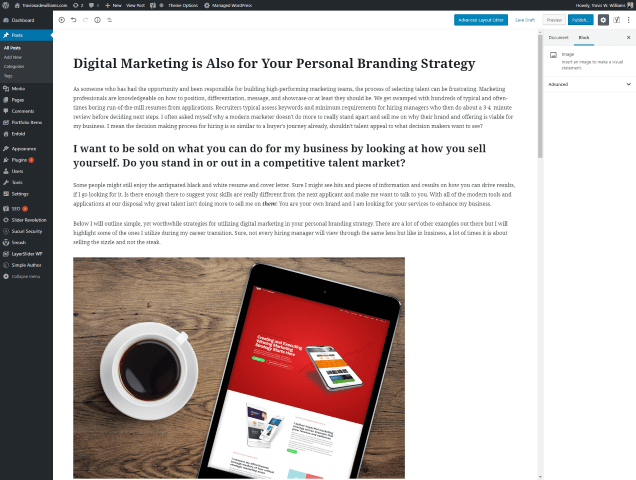
WordPress is a proven content management system utilized by companies and professional web developers alike for over a decade. I have created many websites for companies using WordPress and its ease-of-use is often times better than enterprise systems I use in corporate environments. With many fantastic paid themes available at sites such as ThemeForest, you can find something that works for your personal brand. I utilize GoDaddy’s WordPress Hosting and run my website on WordPress. A word of caution however, is that there is a bit of a learning curve. I encourage all marketing professionals to have working knowledge of how to build in a CMS and WordPress is a great way to learn.
Utilize a website builder and hosting hybrid solution (less advanced)
For those of us that don’t work in corporate CMS updates and website creation, there are many affordable and user-friendly solutions on the market. You can certainly be a novice and less creative and still put forth a fantastic effort. They feature drag-and-drop builders and many templates to give you the look and feel you want. Here are a few I would recommend to get started.
2. Wix (www.wix.com)
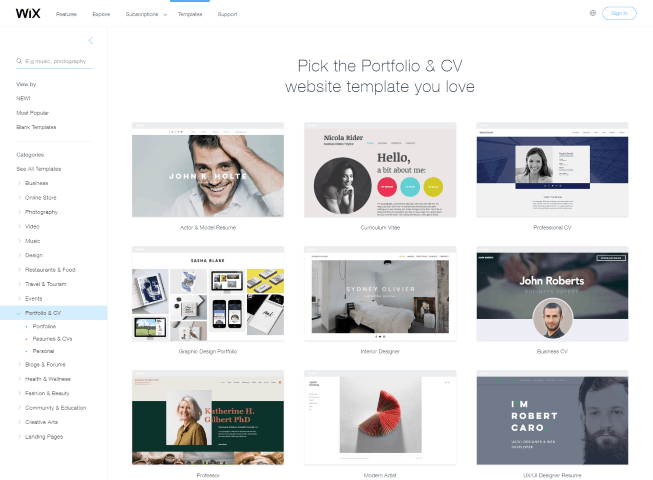
Wix offers a variety of professionally designed and easy to use templates right out of the box. I wouldn’t say they are going to be the most impressive website design but it is better than none at all. It is simple to get started and its free.
3. Site123 (www.site123.com)

I really like the intuitive user experience that greets you when you get the to site. The navigation is great and it gets you started creating your website by asking what type of site you want. Like the other options here, if your creativity or technical capability is limited, they offer great ways to build a personal website to showcase your talents and capabilities.
4. GoDaddy Website Builder (www.godaddy.com)
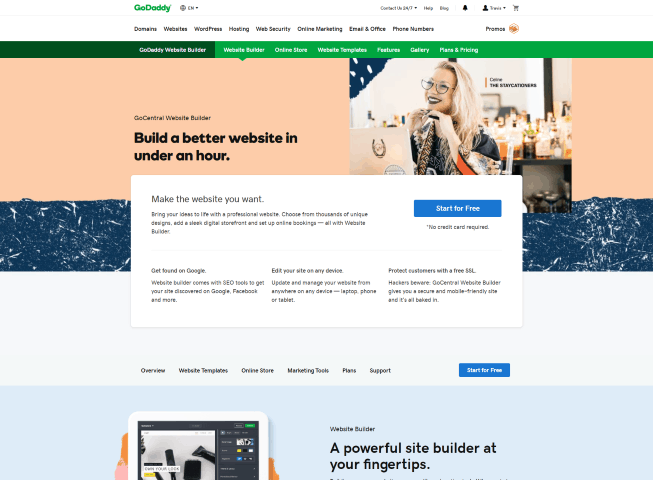
GoDaddy sells a lot of different products but they have really jumped into the pre-made website bundle game. They offer a curation of professionally designed templates to choose from and getting started is free, like the others. Again, you are not going to light the world on fire from a agency-like visual perspective but it can get the job done.
What should I include or showcase on my site?
Think of your personal website as the main place where people go to learn about you. I advise others to keep your actual resume somewhat limited in its information. This is much the same way we would not create a marketing brochure for our product that explained EVERYTHING! Include call-to-action on your resume and application that links them back to your site. This is where you want to drive the traffic and interest. If your goal is to get into discussion phase in a highly competitive talent market, then standing out is of critical importance to your success. Here is a list of items I recommend including on your site and that I have used with success:
- A section about you, a brief narrative and summary of your experiences. This is the foundation of your value-statement and objective. It explains what you can bring to the table.
- What are you good at? Include your expertise and focus strengths that the employer will be wanting to see. Do you have certifications, other skills, or capabilities with software packages? You want to feature them.
- Your work history. I try to think of this section as the resume but expanded significantly. I utilize metrics such as “revenue increased”, “followers created”, “purchases increased” and so forth. Summary of quantification builds trust and credibility in your capability. Make sure you are keeping track of these metrics on your career journey.
- Do you have projects or portfolio? Trust me portfolios are not just for designers and creatives. Whether you created assets, presentations, and other items by yourself or as part of a team, include them. Humans are innately visual and our curiosity drives us to seek more information. It presents information in a way that your resume alone simply can’t.
- Education You can include this in expertise but I recommend keeping it separate so it doesn’t get lost in the information.
- A way to be contacted You can create a very simple form for people to email you as well as include phone number. I would avoid putting stuff like your home address on your website when it is available to the public. Resume distribution with address you can control; not so much with your website.
- Reviews and Recommendations! I can not stress enough that people put getting reviews and reputations at close to the top of their personal branding strategy. Reputation management is a critical strategy for business success so why not for you as well? As a consumer, we use recommendations or reviews for the businesses and products that we want to purchase. Your next hiring manager can be influenced in the same way when weighing you against your competition.
Conclusion
Your resume alone should not be thought of as the only asset showcasing you. In fact, it should not even be at the center of your strategy. At best a resume is a tool to get traffic to your most valuable asset, your personal website. A personal branding website can do much more to showcase your skills, expertise, work history, and capabilities than just a resume alone. There are many affordable and easy-to-use options available for marketing professionals on the market. Remember, this is your personal brand and marketing strategy so putting forth extra effort, no matter the experience-level, can be valuable when your are trying to differentiate.

I am a professionally certified marketing executive with 17 years’ progressive experience; including the last eight years in senior-level marketing roles. He has had significant involvement and application in all areas of the marketing function with primary focus on digital strategy and demand generation across B2B and B2C in technology-featured industries. His experience and skill set help execute visionary and transformational marketing strategies for companies that desire to maximize their marketing capability.
